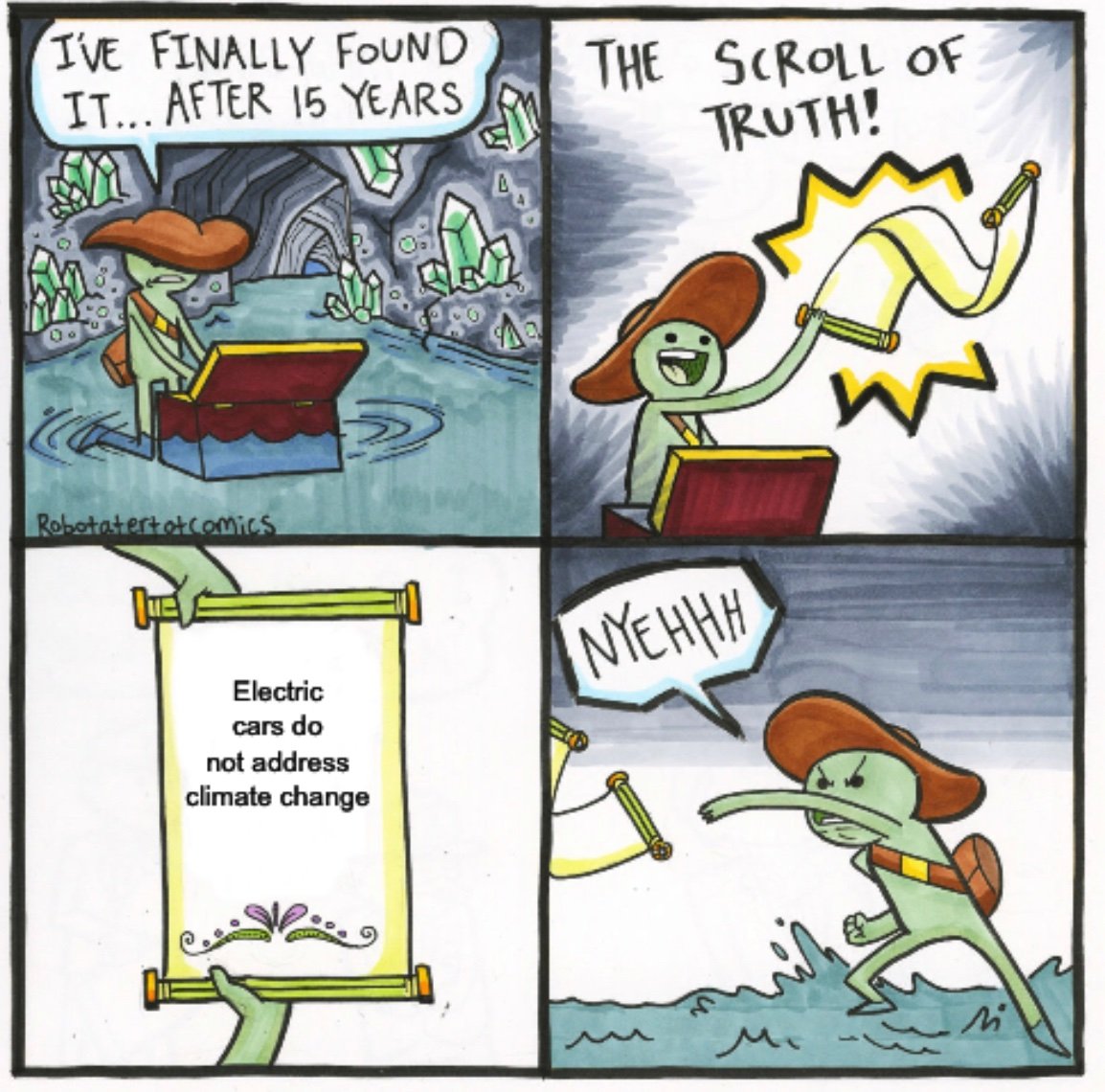Fuck Cars
A place to discuss problems of car centric infrastructure or how it hurts us all. Let's explore the bad world of Cars!
Rules
1. Be Civil
You may not agree on ideas, but please do not be needlessly rude or insulting to other people in this community.
2. No hate speech
Don't discriminate or disparage people on the basis of sex, gender, race, ethnicity, nationality, religion, or sexuality.
3. Don't harass people
Don't follow people you disagree with into multiple threads or into PMs to insult, disparage, or otherwise attack them. And certainly don't doxx any non-public figures.
4. Stay on topic
This community is about cars, their externalities in society, car-dependency, and solutions to these.
5. No reposts
Do not repost content that has already been posted in this community.
Moderator discretion will be used to judge reports with regard to the above rules.
Posting Guidelines
In the absence of a flair system on lemmy yet, let’s try to make it easier to scan through posts by type in here by using tags:
- [meta] for discussions/suggestions about this community itself
- [article] for news articles
- [blog] for any blog-style content
- [video] for video resources
- [academic] for academic studies and sources
- [discussion] for text post questions, rants, and/or discussions
- [meme] for memes
- [image] for any non-meme images
- [misc] for anything that doesn’t fall cleanly into any of the other categories
Recommended communities:
view the rest of the comments

While they don't address it directly, they do provide a route to address it. The issue is a lot of governments are pushing electric cars, and washing their hands of the rest.
There are 3 issues with electric cars.
They are cars - Obvious to most here, but better public transport can vastly improve the situation, regardless of how the car is powered.
Batteries - Electric car batteries are far from perfect. Their range is reduced and they are heavier. There is also the issue of lithium, and/or other chemicals used in the batteries.
Power source - An electric car is only as clean as its energy supply. Powering it from a coal power station is far worse than using renewables.
Counter to these however.
Cars will still be needed, to some extent. Electric are the least worst option we have NOW. We no longer have time to wait for a better option, or find a perfect solution.
Lithium can be recycled; we currently don't, due to the small amounts, but this will change as economics adjust . Also, we are not actually that short of it, it's just not be economically valuable enough to mine on a larger scale. Range can be adjusted as tech improves. We can also change how we operate. E.g. Combining out of town parking and charging with public transport options is an excellent way to get people using public transport on a large scale again, in an organic manner.
Power wise, it's easy to shift an electric car from fossil fuel to renewables. It's very difficult to shift an ICE car. This is also something we should be doing far more anyhow (but no-one seems to be interested in improving the grid!). On a side note, even accounting for various losses. The sheer efficiency factor of a power station means it's still better to burn oil to run an electric car, than to run the car directly on the oil.
Don't get me wrong, the fixation on electric cars is dangerous, but they are still required as part of the solution. We just need to actually work on that solution. While the right, in politics, has a tendency to "circle the wagons" which causes a significant number of problems. The left has a tendency towards "circular firing squads". We should all be careful not to help kill ideas and projects that pull in vaguely the right direction, even if it's not exactly what we want.
My main problems with EVs is that they don't reduce car dependency and the upfront manufacturing environmental cost of making them do not make them more eco friendly across their lifespan (especially with the trend of bigger and heavier cars). Car manufacturers are just jumping on the bandwagon to keep cars relevant in the mind of the consumer and clean their image of more obvious pollutants such as gas and oil.
Electric cars will just perpetuate all the other problems with cars, while tricking consumer into thinking they're making an environmentally sound choice and clean their conscience. There was still a giant environmental cost to making them, children still mined lithium for them, tyre rubber will still fill the lungs of people, etc etc.
EVs start their life with a higher environmental burden than ICE vehicles, but the math comes out so that the burden becomes lower after between 15k-20k miles.
By the end of life of an EV, they are more eco friendly than an ICE vehicle of similar build.
Also, “Environmental burden” and “eco friendly” are generic buzzwords used to lump other environmental issues like micro plastics or habitat destruction in with the reduction of green house gases.
I wonder how the math would work out when it is strictly about reduction of greenhouse gases and factors unrelated to our dependency on fossil fuels are not skewing the results.
Good point. I was referring to analyses I read that were calculating the carbon footprint specifically. Apologies for using vague language.